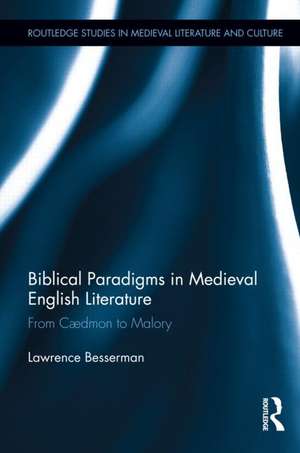Biblical Paradigms in Medieval English Literature: From Cædmon to Malory: Routledge Studies in Medieval Literature and Culture
Autor Lawrence Bessermanen Limba Engleză Hardback – 17 oct 2011
Din seria Routledge Studies in Medieval Literature and Culture
-
 Preț: 389.66 lei
Preț: 389.66 lei -
 Preț: 443.69 lei
Preț: 443.69 lei -
 Preț: 389.66 lei
Preț: 389.66 lei -
 Preț: 469.34 lei
Preț: 469.34 lei - 17%
 Preț: 256.67 lei
Preț: 256.67 lei -
 Preț: 251.32 lei
Preț: 251.32 lei - 17%
 Preț: 258.70 lei
Preț: 258.70 lei -
 Preț: 389.66 lei
Preț: 389.66 lei - 17%
 Preț: 269.00 lei
Preț: 269.00 lei -
 Preț: 383.50 lei
Preț: 383.50 lei -
 Preț: 382.91 lei
Preț: 382.91 lei -
 Preț: 383.89 lei
Preț: 383.89 lei - 20%
 Preț: 276.70 lei
Preț: 276.70 lei -
 Preț: 381.98 lei
Preț: 381.98 lei -
 Preț: 386.61 lei
Preț: 386.61 lei -
 Preț: 390.41 lei
Preț: 390.41 lei -
 Preț: 389.66 lei
Preț: 389.66 lei -
 Preț: 389.66 lei
Preț: 389.66 lei - 17%
 Preț: 257.25 lei
Preț: 257.25 lei -
 Preț: 389.66 lei
Preț: 389.66 lei -
 Preț: 389.66 lei
Preț: 389.66 lei -
 Preț: 385.04 lei
Preț: 385.04 lei - 18%
 Preț: 1109.18 lei
Preț: 1109.18 lei -
 Preț: 385.47 lei
Preț: 385.47 lei - 18%
 Preț: 1000.76 lei
Preț: 1000.76 lei
Preț: 1059.84 lei
Preț vechi: 1292.49 lei
-18% Nou
Puncte Express: 1590
Preț estimativ în valută:
202.79€ • 211.74$ • 167.84£
202.79€ • 211.74$ • 167.84£
Carte tipărită la comandă
Livrare economică 04-18 aprilie
Preluare comenzi: 021 569.72.76
Specificații
ISBN-13: 9780415897945
ISBN-10: 0415897947
Pagini: 252
Ilustrații: 12 b/w images, 11 halftones and 1 line drawing
Dimensiuni: 152 x 229 x 20 mm
Greutate: 0.6 kg
Ediția:1
Editura: Taylor & Francis
Colecția Routledge
Seria Routledge Studies in Medieval Literature and Culture
Locul publicării:Oxford, United Kingdom
ISBN-10: 0415897947
Pagini: 252
Ilustrații: 12 b/w images, 11 halftones and 1 line drawing
Dimensiuni: 152 x 229 x 20 mm
Greutate: 0.6 kg
Ediția:1
Editura: Taylor & Francis
Colecția Routledge
Seria Routledge Studies in Medieval Literature and Culture
Locul publicării:Oxford, United Kingdom
Public țintă
Postgraduate and UndergraduateCuprins
Preface List of Illustrations Introduction 1. Biblical Paradigms in Old English Verse: Cædmon’s Hymn, Exodus, and Beowulf 2. Sacred and Secular in the Middle English Lyric: "Maiden in the Moor Lay" and "I Sing of a Maiden" 3. Sacred and Secular in the World of Romance: The Idea of the Green Knight 4. Biblical Analogies and the Language of Love in Chaucer’s Troilus and Criseyde 5. Chivalry and the Scandal of the Sacred in Malory’s Le Morte Darthur Conclusion List of Abbreviations Works Cited
Notă biografică
Lawrence Besserman is Professor of English, emeritus, at The Hebrew University of Jerusalem; he has also taught at Columbia, Harvard, and NYU. Among his previously published books are The Legend of Job in the Middle Ages, (Harvard, 1979), Chaucer and the Bible (Garland, 1988), and Chaucer’s Biblical Poetics (Univ. of Oklahoma, 1998). He has edited two collections of essays: The Challenge of Periodization: Old Paradigms and New Perspectives (Garland, 1996) and Sacred and Secular in Medieval and Early modern Cultures: New Essays (Macmillan-Palgrave, 2006).
Recenzii
"This book will appeal to anyone interested in medieval literature and culture. Summing Up: Recommended." --C. S. Cox, University of Pittsburgh, CHOICE
"Erudite and thought-provoking book" --Mary Davy Behrman, Arthuriana
"The bibliography is extensive and the notes are full, and the book will serve as a useful guide to a partiucular area of criticism and scholarship on some of the most widely studied texts of medieval English literature." --William Marx, Studies in the Age of Chaucer
"Erudite and thought-provoking book" --Mary Davy Behrman, Arthuriana
"The bibliography is extensive and the notes are full, and the book will serve as a useful guide to a partiucular area of criticism and scholarship on some of the most widely studied texts of medieval English literature." --William Marx, Studies in the Age of Chaucer
Descriere
This book examines the intricate and unusual relationship between the sacred and secular spheres of English medieval culture, positing that the assimilation of sacred and secular motifs could be in either direction, or even in both directions. That is, medieval English writers could appropriate biblical paradigms to express secular themes, and vice versa. Codicological, psychoanalytic, feminist, and new historicist insights inform readings of Beowulf, Middle English lyric poetry, the Gawain-poet, Chaucer, and Malory, among others. Besserman elucidates the structural and thematic complexity of the integration of biblical and biblically derived sacred diction, imagery, character types, and themes in the works under consideration, identifying within them new biblical sources and analogues and providing fresh insights into the contextual meaning and significance of the biblical paradigms they deploy. This book highlights the shaping influence of biblical and biblically derived sacred paradigms on exemplary literature produced in the Middle Ages.
